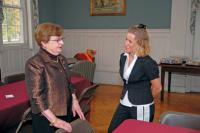Holocaust Survivors Share Experiences with TCNJ Students
 For years, Vera Goodkin, a Holocaust survivor, kept her story of atrocity, tragedy, inspiration, and courage to herself out of fear and pain. Last fall though, she shared it with English major Ashley Reichelmann ’08. The exchange between Reichelmann and Goodkin was one of many that occurred between TCNJ students and Holocaust survivors as part of an ethnography project.
For years, Vera Goodkin, a Holocaust survivor, kept her story of atrocity, tragedy, inspiration, and courage to herself out of fear and pain. Last fall though, she shared it with English major Ashley Reichelmann ’08. The exchange between Reichelmann and Goodkin was one of many that occurred between TCNJ students and Holocaust survivors as part of an ethnography project.

Goodkin (left) and Reichelmann

Vera Goodkin was a 12-year-old captive in a Nazi prison in 1944 when three men claiming to be from the Swedish Red Cross arrived to take away any child between the ages of 5 and 14 whose mother would allow it. Of the 700 or so mothers being detained, Vera’s was the only one who let her child go.
Once clear of the prison, the men told Goodkin they actually worked for Raoul Wallenberg. Wallenberg was a Swedish humanitarian who saved thousands of Jews from the concentration camps. The men brought Goodkin to a safe house in Budapest, where she met other children who had been rescued. During her time there, Wallenberg would come play with the children each night. Goodkin’s stay was interrupted when she developed Scarlet fever and had to be quarantined for six weeks. When she returned, Wallenberg was gone.
Goodkin’s parents, still under the impression their daughter had been taken by the Red Cross, later escaped from the Nazis. In a serendipitous turn of events, Vera’s father encountered Wallenberg and asked the diplomat for Schutz passes for he and his wife. The passes gave the bearer protection under Swedish law. Wallenberg handed Goodkin’s father the passes and then said, “I have something else that belongs to you: your daughter.”
After being reunited, the family hid in a cellar for the 10 weeks until the Russians finally liberated their block. Though she and her parents were saved, Goodkin’s maternal grandparents and many of her uncles were among the millions murdered at Auschwitz.
After the war, Goodkin immigrated to the United States. For years, she kept her story of atrocity, tragedy, inspiration, and courage to herself out of fear and pain. Last fall though, she shared it with English major Ashley Reichelmann ’08.
The exchange between Reichelmann and Goodkin was one of many that occurred between TCNJ students and Holocaust survivors as part of two classes: Representing the Holocaust, a senior seminar capstone taught by Professor of English Ellen Friedman, and Representations of the Holocaust, an honors class co-taught by Friedman and Professor of Art Lois Fichner-Rathus.
Students in both courses met regularly with Holocaust survivors living in New Jersey, and ultimately compiled ethnographies of the survivors’ experiences. Friedman, who is writing a book on her own family’s experiences in the Holocaust, was particularly pleased about the personal and intellectual growth that the students gained.
“Many students at first dreaded going into the home of a stranger and asking him or her personal questions. They had a lot of personal anxieties to overcome to complete this project. But they did, and as a result, they formed lasting relationships,” Friedman said.
“Dr. Goodkin taught me more about life, particularly about the danger of remaining silent, than any classroom ever could,” said Reichelmann. “She wants me to learn. She wants to give her past so I can share it.”
The students’ writings will ensure that the survivors’ stories live on. “In some cases, the survivors had not talked very much about their Holocaust experiences to their children, and these ethnographies will be the way they pass on this legacy in their families,” said Friedman.
“It’s comforting to know that when I am no longer here, [Ashley] will remember and pass on my story,” said Goodkin.
Posted on June 2, 2008

